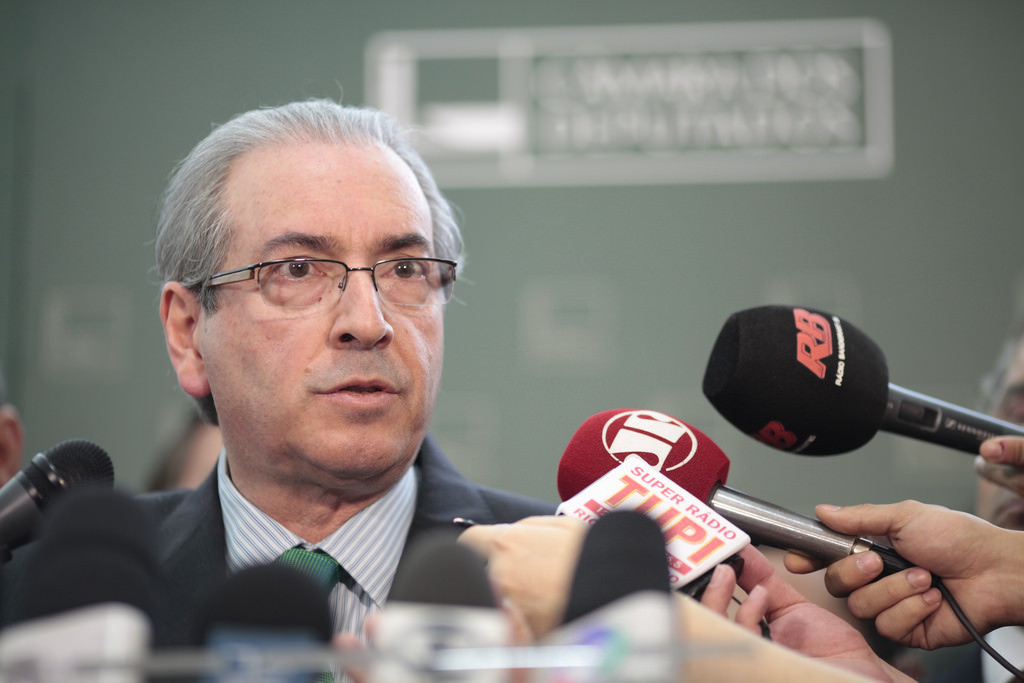
Written by Kjersti Thorkildsen, PhD Fellow, Noragric.
Brazil is now going through one of its worst political crises since the military coup in 1964. The economy is facing its deepest recession in decades, the Operation Car Wash (Lava Jato) corruption scandal – involving state-owned oil company Petrobras, large construction companies and political parties – is under investigation, and impeachment proceedings have been opened against President Dilma Rousseff from the Workers’ Party (PT), based on accusations of having covered budget deficits prior to her re-election in 2014.
Massive street demonstrations by the conservative opposition have taken place across the country in recent months, and on Sunday (17 April, 2016), more than two thirds of the Lower House of Congress voted in favour of her impeachment. The impeachment process will now go to the Senate, and if voted by a simple majority, Rousseff will be put on trial for up to 180 days, during which she will have to leave office temporarily. After the trial, the case will be taken up again in the Senate and if it gets a two third majority, Rousseff will need to resign. The power would then pass to Vice-President Michel Temer from the conservative Brazilian Democratic Movement Party (PMDB), the largest and most corrupt political party in Brazil.
Temer himself is faced with much more serious accusations than Rousseff and is under investigation for involvement in ‘Operation Car Wash’. In addition, two of his party colleagues in high positions – the leader of the impeachment process and president of the Lower House of Congress, Eduardo Cunha, and the president of the Senate, Renan Calheiros – are accused of corruption and are under investigation in the Supreme Court for bribery and money laundering. Therefore, theoretically, if Rousseff falls, Temer, Cunha and Calheiros – who would be the successors in line – could also fall, which has inspired comparisons with the TV-series House of Cards. However, this will probably not happen. Once in office, Temer’s first emergency plan would likely be to put a lid on the Operation Car Wash investigation, muffling the accusations pending over his PMDB partners-in-crime, and at the same time, declare to the world that the problems of corruption have been solved, now that PT is out of the game.
Many have called the impeachment process a political coup to overthrow President Rousseff and an attack on democracy. Rousseff herself claims that there are no legal grounds for the impeachment. Delaying payments to state lenders while elections are underway – so that the budget deficit appears lower – is actually common practice in Brazil and is employed by many elected officials who have not been charged of breaking budgetary laws. The person leading the impeachment process, Eduardo Cunha, is one of the most corrupt politicians in Brazil’s recent history and is himself under investigation for having stashed millions of dollars in Swiss bank accounts. The Vice President and more than half of the congressmen (352 out of 594) who voted for Dilma’s impeachment in the lower house of Congress are also under investigation or charged with fraud, corruption and constitutional crimes. Dilma is in fact one of the few political leaders who is not accused of bribery or personal corruption. In other words, it is the ‘pot calling the kettle black’.
So what is this really all about? Broadly speaking, the impeachment is about two things: PMDB wants more power and Cunha and the other corrupt political leaders want to save their asses from the criminal investigations. Rousseff, not willing to play the game, needs to be removed.
The Workers Party (PT) has won four consecutive elections, and has been in power for 13 years. The popular and charismatic Luiz Inácio ‘Lula’ da Silva won in 2002 and 2006, and Rousseff won in 2010 and 2014. During the last election, 18 months ago, Rousseff got 54 million votes. The poor in particular have put their trust in PT, which has initiated a diverse array of social benefit programs to ‘lift the poor out of poverty’. The elite, however, have long been unsatisfied with PT, but have not been able to defeat it.
PT has, however, lost much of its popularity. This is for two reasons. Firstly, because of the sweeping corruption problems inside the party, as leading political figures from PT have been jailed for corruption in connection with the mensalão case during Lula’s rule (clandestine payments made by PT to congressional allies in return for support for its legislative agenda) and Operation Car Wash during Rousseff’s rule. Secondly, the present economic crisis has led to millions of people losing their jobs and unemployment has reached more than 10 percent of the workforce. Dissatisfaction with the ruling government, both from conservative parties and PT’s own constituencies, has opened a political opportunity by the opposition to make a move.
Rousseff’s impeachment started as a revenge by Cunha after PT refused to help him avert a decision by the Lower House’s Ethics Committee on whether or not he had lied under oath to Congress about undeclared Swiss bank accounts. On 2 December, 2015 Cunha opened proceedings against Rousseff, and on 29 March, 2016, PMDB announced that it was breaking its coalition with PT, officially migrating to the opposition.
It is quite ironic that one the most corrupt politicians is the leader of the impeachment process. Or maybe not. It is actually quite clever. Cunha will most likely be awarded with ‘amnesty’ or a soft penalty in exchange for the hard task of having manoeuvred for Rousseff’s impeachment. If Temer takes over as President, he would have a more friendly Congress to deal with. Temer could also moderate the Operation Car Wash investigation through the Ministry of Justice, who controls the Federal Police, or by appointing a more friendly Attorney General who could close or discontinue uncomfortable cases. Rousseff’s impeachment process both diverts the attention from the investigations pending over Cunha and other congress members, and accrues power to PMDB. A win-win situation, at least for PMDB. But not for Brazil.

For the Brazilian people – particularly the lower and middle classes – and for the environment, this would be a lose-lose situation. Many think that the impeachment of Rousseff is a right-wing conspiracy to withdraw social benefits conquered by Brazil’s poorest since Lula took office in 2003. PMDB is a political party based on patronage and clientelism. It has a conservative stand, endorses economic liberalisation and does not prioritise social welfare programs.
If Temer becomes Brazil’s President, he will likely further open up for economic liberalisation and probably push for an agenda even more damaging to the environment than Rousseff, which is not insignificant. Environmental licensing is likely to become even easier and quicker in order to attract foreign investments. No one seems to remember the largest environmental catastrophe in Brazil’s history which took place in November last year when a dam from an iron ore mine in Mariana (in the state of Minas Gerais) burst. Due to the overfilling of iron slam and the poor condition of the dam – ignored by environmental authorities – 60 million cubic meters of iron waste entered the Doce River and reached the Atlantic Ocean, killing 18 people, burying villages and agricultural fields, and causing severe impacts on wildlife and ecosystem functions. The dam was the property of Samarco – a joint venture between Brazilian Vale and Australian BHP Billiton, which had maximised profits by minimising investments in security measures. If environmental licensing in Brazil is further weakened to support private industries’ interests, one can expect that many controversial development projects will go forward and that many more catastrophes will occur in the near future.
Also, the rights of indigenous people and Afro-Brazilian quilombolas (descending from slaves) would probably further be weakened if PMDB gains power. Already, constitutional challenges against the rights of indigenous peoples and quilombolas have been filed by conservatives, and these will most likely gain momentum with PMDB in office. For instance, the proposed constitutional amendment 215 (PEC215) intends to change the Brazilian Constitution to transfer the responsibility for demarcation of indigenous and quilombola lands and creation of protected areas in Brazil from the Executive to the Legislative, making approval of demarcation the exclusive power of Congress. This will, in practice, mean that the titling of indigenous and quilombola lands will become increasingly difficult, due to the influence of the powerful agribusiness block (bancada ruralista) in Congress. Furthermore, PEC 215 will open up indigenous lands for economic exploration, establishment of military bases, installation of communication networks, building of roads, hydropower dams and other projects serving the ‘public interest’, regardless of prior consultation with indigenous peoples. Quilombolas will also be directly affected by the proposed measure as their right to land will be reduced to the criteria that the community is physically present on its territory at the date of the enactment of the new Constitution. This means that quilombos that were expelled from their lands before 1988 would not be able to have their land rights granted.
So, if things were bad under Rousseff’s government, one can expect it to get even worse under Temer.

Kjersti Thorkildsen is a PhD Fellow at Noragric. She will be defending her doctoral thesis on 15 June 2016 at NMBU. The thesis is titled ‘Contesting conservation and development: quilombolas struggling for rights and resources in the Ribeira Valley, Brazil`.


